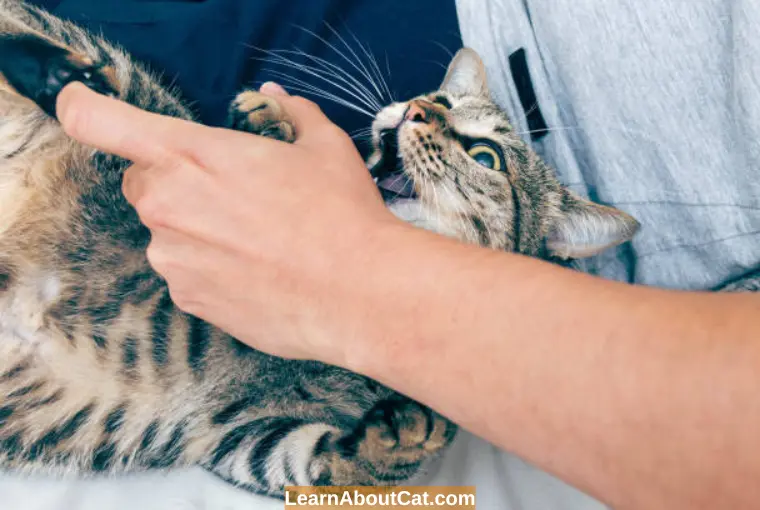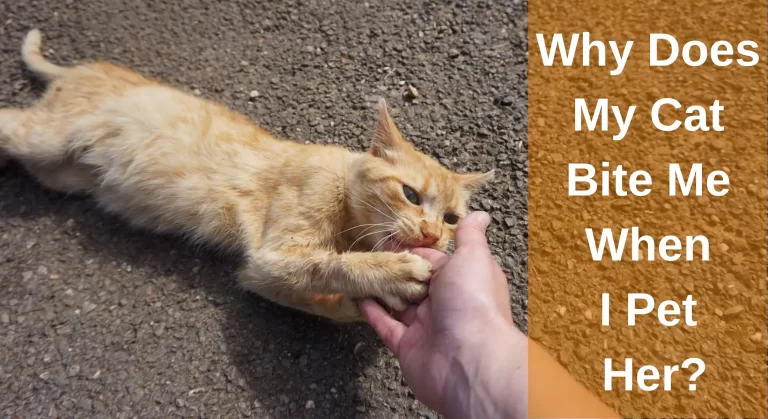Why is My Cat Attacking Me All of a Sudden? And How To Handle
Cats have a bad image for being unpredictable due to their penchant for aggression and unpredictability. This might be really damaging. Sadly, cat aggression is a very common problem. Actually, it’s the second most popular excuse for bringing in a behavioural specialist.
If your cat suddenly attacks you, you’re probably also trying to figure out why is my cat attacking me all of a sudden. What specifically went wrong? However, this problem cannot be solved easily.
Cats may attack their owners suddenly due to several reasons, including fear, anxiety, medical issues, territorial behaviour, overstimulation or redirected aggression. It’s important to identify the root cause of the behaviour and address it accordingly. Punishment is not effective and may worsen the behaviour.
When you’ve read my analysis of each in this post, decide which you think applies. The first and most important step in stopping your cat’s attacks on you is determining what is causing them.
In this article, we will explore the possible reasons why your cat is attacking you all of a sudden, and provide some helpful tips to help you and your cat live together peacefully.

Understanding Feline Behavior
Before we delve into the reasons for a cat’s sudden aggression, it’s important to understand feline behaviour. Cats are naturally curious, and they express themselves through body language, vocalization, and behaviour.
Cats are territorial animals, and they can become aggressive when they feel threatened. They may also become aggressive when they are in pain, anxious, or frightened.
It is also important to note that cats are very sensitive animals, and they can pick up on their owner’s emotions. If you are stressed or anxious, your cat may become agitated and display aggressive behaviour.
Reasons: Why is My Cat Attacking Me All of a Sudden
There are several reasons why your cat may be attacking you all of a sudden. Here are some of the most common reasons:
1. Play Aggression
Cats are hunters by nature and play fighting is a normal part of their behaviour. Because hunting is a survival skill for wild cats, it is built into their DNA. They would practically starve to death if they didn’t hunt and acquire their next meal. The odds of survival increase with the level of the hunter.
Domestic cats still retain these hunting tendencies even if they don’t need to hunt since you feed them breakfast, noon, and supper without making them work for it. Play is one way to deal with this habit.
However, sometimes their playfulness turns into aggression if the cat becomes overly excited or stimulated. This can be especially true for kittens or younger cats, who may not have learned appropriate play behaviour yet.
Encouragement of aggressive play is inappropriate since it ignores undesirable behaviour (not reinforcing it with your attention). If your cat attempts to play rough, get out of there, ideally into another room, close the door, and keep quiet.
No reaction indicates that your cat does not receive attention for the undesirable behaviour (and as a result, they are less likely to do it if they realise they won’t receive attention for it).
In positive reinforcement training, “good” behaviour is also rewarded. Therefore, you may give the cat a food treat when they are playing with their cat toy or when they are comfortable and peaceful.
Find Out: Do Cats Get Mad At You?
2. Territorial violence
Cats are ferociously territorial creatures who use scent to claim objects and areas as “theirs.” If their territory is in jeopardy, they will stop at nothing to preserve it.
As a result, if your cat suddenly starts attacking you, it may be because they believe its territory is being invaded.
When a stranger or new animal enters your home, territorial aggression typically follows. Your cat dislikes suddenly having to share its space with this new creature since it is unfamiliar with it. Then, they frequently escalate their violence in an effort to defend what they perceive to be “theirs.”
3. Anxiety & Fear
Fear aggression is another common reason why cats suddenly attack their owners. Cats are extremely sensitive creatures that often become startled. Strange smells, a new person or pet in the household, loud noises, and schedule interruptions can all cause fear. If your cat is suddenly attacking you, it may be a sign that they are feeling fearful or anxious.
In response to fear, cats no longer snap and attack. They attempt to scare the threat away at first before running away.
Sometimes, Cats will arch their backs to make themselves appear larger and more dominant. Additionally, they’ll look for a fast escape they can utilise in case things become physical.
Take action to prevent the trigger condition from happening, such as blocking window sill access, covering windows, or excluding other cats. If the cat appears to be excited by something, don’t handle them.
It could be feasible to gradually desensitise the cat to the frightening stimuli, or you might adopt a counter-conditioning technique in which you reward the cat with food when they remain calm in the trigger setting.
Rewarding a calm child with a goodie strengthens their ability to remain relaxed while being exposed to the horrific occurrence.
Additionally, medication may be used with behavioural adjustment (your vet will advise).
4. Health Issues
Every time my cat bites me without cause, I call my veterinarian. Unusual aggressive behaviour is commonly associated with medical conditions.
These illnesses may cause your cat discomfort, which makes them irritable and irritated. These feelings could lead to aggression toward you and other individuals.
Cats are masters at hiding their pain. Again, this relates to survival since predators are more inclined to attack cats who appear sick, injured, or fragile in the wild.
Cats have a better chance of surviving if they can conceal their discomfort and act as though nothing is wrong.
If you notice any other changes in your cat’s behaviour or health, such as a lack of appetite or lethargy, it is important to take them to a veterinarian for a check-up.
5. Previous Trauma
Oftentimes, cats with a history of trauma are more sensitive. They could exhibit aggressive behaviour more frequently than other cats and have too intense reactions.
This typically results from anything that triggers heightened responses in them and terrible recollections of their event.
It’s very possible that your cat, which you recently acquired off the street, attacked you without reason.
They are agitated mentally, which is why they act erratically and maybe aggressively. They can’t control their mental disease, which regrettably frequently manifests as rage.
6. Petting-Induced or Overstimulation Aggression
When I pet my cat, she occasionally bites me. Petting-Induced aggression produced by petting is the term used to describe this form of antagonism.
It is a result of overstimulation. When you give your cat a long, satisfying stroking, the joy and satisfaction morph into pain. Like most things in life, cats only sometimes like being touched. If your cat suddenly attacks you after a long petting session, it may be a sign that they have had enough.
Every cat has its own restrictions when it comes to cuddling. Some creatures are quite patient and will happily allow you to pet them for about 30 minutes. We must respect these limitations, no matter what they may be.
7. Redirect Aggression
Redirected aggression occurs when a cat is upset by something, but cannot direct their aggression towards the source of their distress. Instead, they may redirect their aggression towards their owner or another animal in the home.
This can occur when a cat is watching something outside the window, such as a bird or another animal, and becomes upset or aroused. If your cat is suddenly attacking you, it may be due to redirected aggression.
Take action to prevent the trigger condition from happening, such as blocking window sill access, covering windows, or excluding other cats.
Also Read: Why Is My Cat Hissing at Me All of a Sudden?
8. Lack of Socialization or Training
Cats that haven’t been properly socialized or trained may also exhibit aggressive behaviour. This can be due to a lack of exposure to other people or animals, or a lack of understanding of appropriate behaviour.
It’s essential to socialize kittens from a young age and expose them to different people, sounds and smells to prevent aggressive behaviour later in life.
Providing socialization opportunities and training your cat using positive reinforcement techniques can help reduce aggressive behaviour and improve its overall behaviour and demeanour.
9. Noise-Induced Aggression
Certain sound frequencies have the potential to make cats aggressive. Examples include the howling of another cat, high-pitched whistling, a baby screaming, or squeaking sounds.
Avert trigger sound frequencies (where possible)
When it is acceptable and safe to do so, you can experiment with desensitisation and counter-conditioning. The “trigger” sound is played at a very low volume to desensitise a cat to noise.
If the cat remains relaxed and comfortable, they are then rewarded with a delectable treat (counter-conditioning). The cat gets treats as long as they remain calm and quiet throughout the sound, which is then gradually raised.
Check Out: How To Stop My Cat From Biting and Attacking Me?
10. Heat and Sexual Aggression
Finally, if your cat is in heat, it could attack you without warning. This results in a number of behavioural changes. While some females grow friendlier while they are in heat, some females become aggressive and attack their owners.
Males do not go into heat, yet when sexually aroused, they may still attack. When they detect a nearby female is in heat, males become fixated on finding and mating with her.
Male cats have a tendency to grab the female and bite her during mating to keep her from escaping. Recognise the warning signals of an aggressive sexual mount to stop it (e.g. leave the room).
So, distract the cat’s attention when this behaviour starts by giving it a toy or some food (food treats should not be given if the cat is already showing aggression as this may negatively reinforce the behaviour).
Intresting Reading: Why Does My Cat Bunny Kick Me?
How to Prevent Your Cat from Attacking You
After an exploration of the probable causes of a feline’s aggression towards its owner, it is time to dive into how to deal with this behaviour.
To prevent your cat from attacking you, it is essential to comprehend their behaviour and address any underlying issues that may be causing their aggression. Here are some tips that can help you prevent your cat from attacking you:
1. Consult Your Veterinarian
If a medical ailment is the cause of your cat’s aggressive behaviour, it is imperative to seek the advice of a veterinarian. They will conduct a thorough examination and propose a suitable treatment plan.
2. Identify Triggers
Identify what triggers your cat’s aggression and eliminate them from their environment. For example, if your cat becomes agitated by loud noises, offer them a peaceful and secure place to retreat to.
Provide Ample Stimulation: Ensure that your cat has plenty of toys and playtime to keep them mentally and physically stimulated.
3. Create a Safe Space
Provide your cat with a safe space where they can retreat when they feel stressed or anxious.
Play with Your Cat: Cats require playtime and exercise to release pent-up energy. Engage in playtime with your cat using toys such as a laser pointer or feather wand that they can chase and pounce on.
4. Establish Boundaries
During playtime, if your cat starts to exhibit aggressive behaviour, set limits to let them know what is acceptable. For instance, if your cat bites or scratches, immediately discontinue playtime and give them a time-out.
5. Positive Reinforcement
Positive reinforcement is an effective method of training your cat to display acceptable conduct. When your cat demonstrates calm and non-aggressive behaviour, reward them with treats and praise.
Avoid Punishment: Avoid punishing your cat for its aggressive behaviour, as it can exacerbate the issue.
6. Consult a Professional
If your cat’s aggressive behaviour persists, it may be useful to seek the guidance of a professional animal behaviourist. They can work with you and your cat to determine the root cause of the aggression and create a training regimen.
Frequently Asked Questions
How do you discipline a cat for attacking?
It is not recommended to discipline your cat for aggressive behaviour. This can worsen the behaviour and cause your cat to become fearful or anxious. Instead of physically disciplining the cat, walk away, focus on positive reinforcement or use a non-physical punishment like a water sprayer, compressed air can cap gun, hand-held alarm or perhaps a loud hiss if the cat begins to swat or attack.
Is it normal for cats to become aggressive?
While cats are generally calm and affectionate pets, it is not uncommon for them to display aggressive behaviour. It is important to identify the reason behind your cat’s aggression and address the issue.
Can a cat’s sudden aggression be a sign of a medical problem?
Yes, a cat’s sudden aggression can be a symptom of an underlying medical issue. It’s important to have the cat examined by a veterinarian to rule out any physical problems.
Can neutering prevent territorial aggression in male cats?
Yes, neutering can reduce territorial aggression in male cats. It can also prevent other behavioural issues and improve the cat’s overall health.
Closing Words!
You’ve just learned that there isn’t a simple answer to this problem! Cats can become aggressive for a number of reasons, including improper play, too much excitement, territorial dread of other cats, or sexual unhappiness. One of the riskiest and most puzzling types of animosity is redirected aggression. Additionally, an illness or injury is likely the reason for how your cat is behaving.
Whatever the reason, it’s imperative to stop this bad habit. Because cats may be ferocious, you don’t want to get hurt! After completing some research, try some of the ideas in this article to help calm your cat.
If nothing seems to be working, think about seeing a behavioural specialist. You two may rebuild your previous connection with a bit of work and drive; you don’t have to live in continuous fear of being attacked by a cat.
Who is Isabella?
My name is Isabella, and I am a dedicated and knowledgeable cat enthusiast. With years of experience caring for cats and a deep love for felines, I made a mission to help other cat lovers navigate the challenges of cat ownership.






